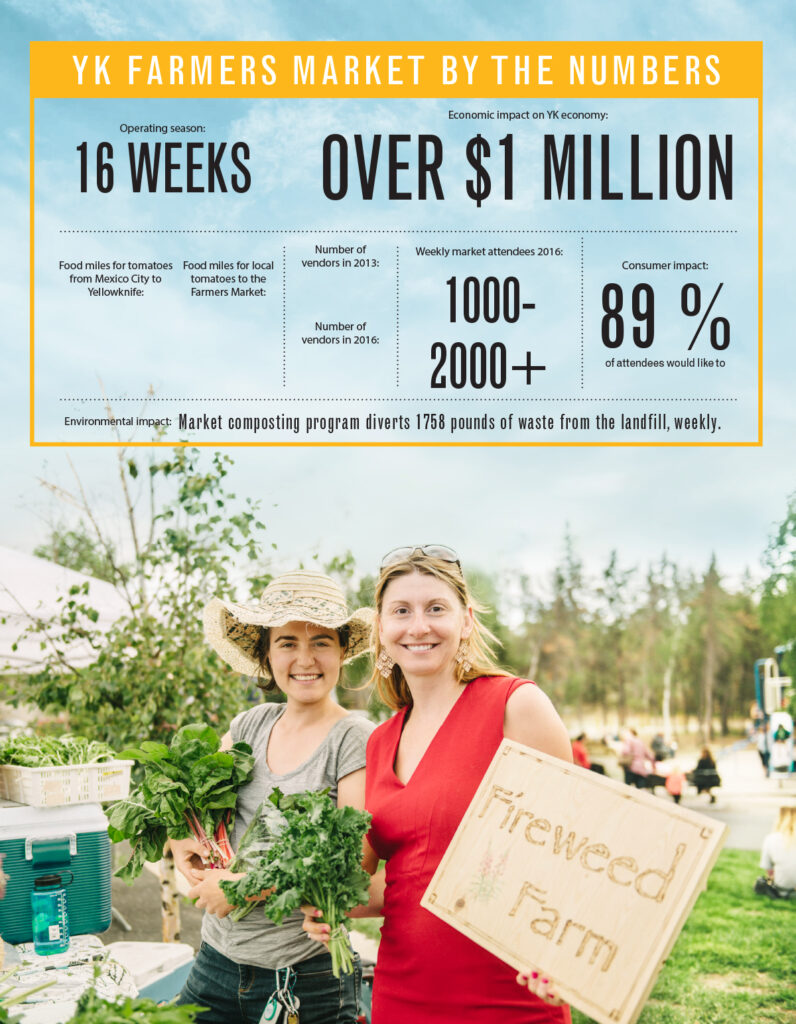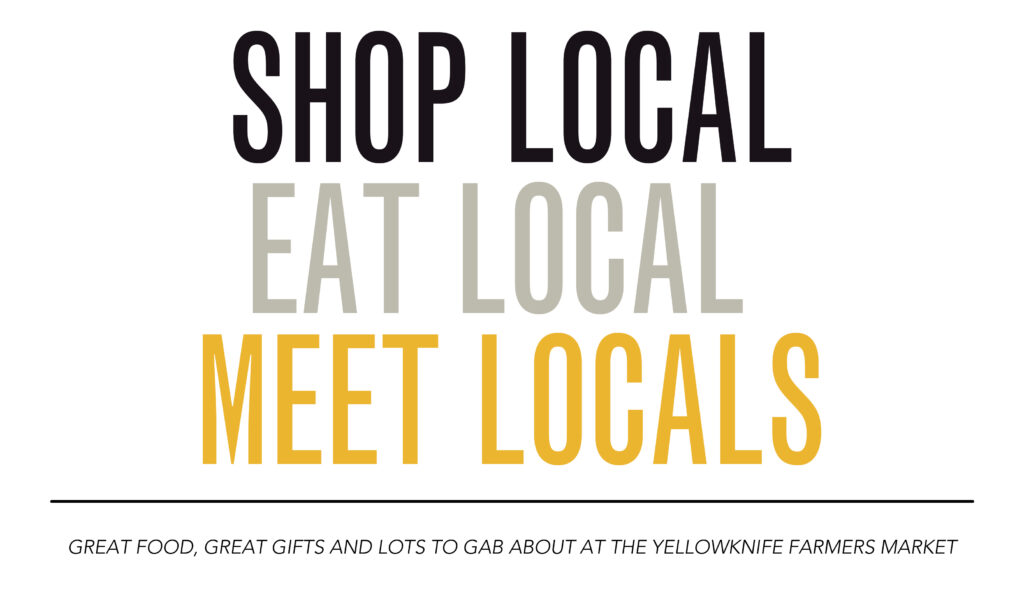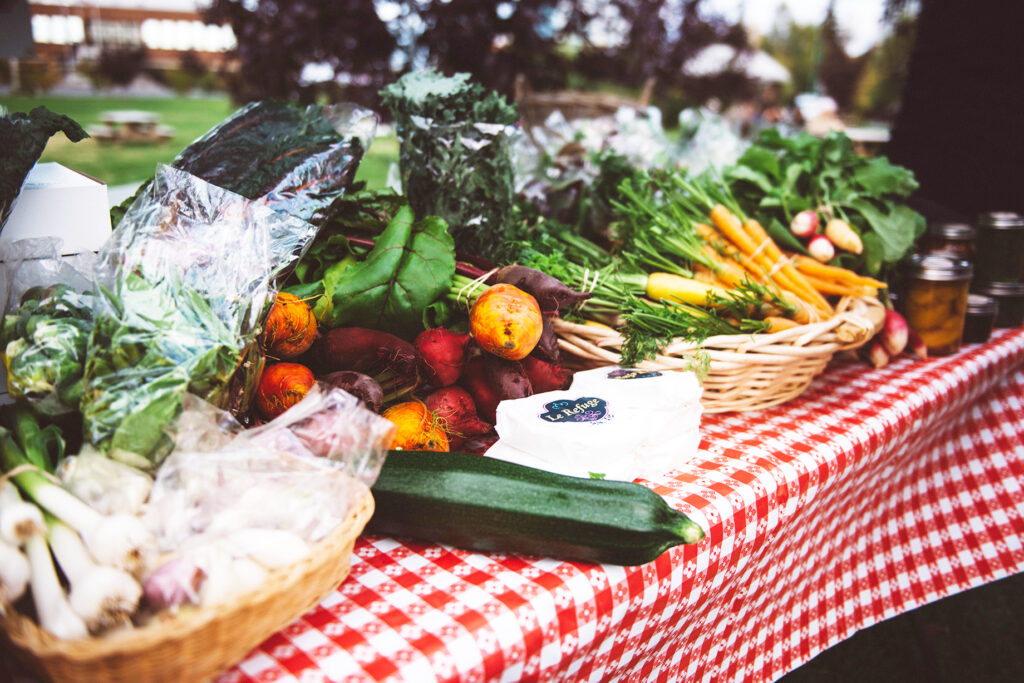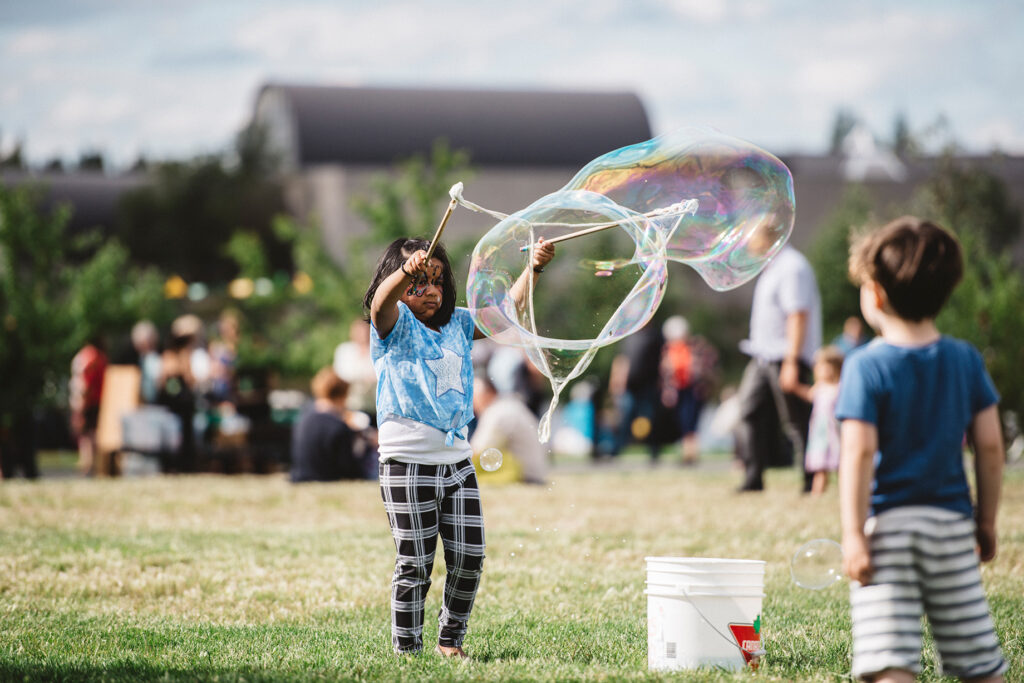Shop Local. Eat Local. Meet Locals.



By Alayna Ward
One can be forgiven for a growling stomach on any summer Tuesday evening at Yellowknife’s Somba K’e Civic Plaza. It’s nearly suppertime, and the delicious aromas wafting across the entire plaza from the many kiosks setting up to sell and serve freshly prepared food are tantalizing. Musicians are tuning up for the evening’s entertainment, kids play tag on the green grass and the hungry after work crowd checks out what’s for supper – butter chicken, pad Thai or tempura and sushi, and a fresh-made cupcake for dessert, anyone?
At precisely 5:15 p.m., a bell chimes out over the plaza, officially opening the Market’s weekly sales. People queue for their favourite food kiosk, others check out the fresh local produce and still others look for bargains and gifts among the many kiosks offering locally made artisanal preserves and handicrafts.


Welcome to the Yellowknife Farmers Market, the weekly summer evening event that showcases excellent food, fresh produce, good music and locally made arts and crafts. Running for 16 weeks from mid-June to Mid-September, this ultimate outdoor “#ShopYK” experience has seen consistent growth since its inception in 2013.
Opening the first market that year was a huge collective effort, developed from the first seeds sown by Amy Lizotte and France Benoit, both local food security advocates. Lizotte researched the viability of commercial gardening in Yellowknife and was one of the founding members of the Yellowknife Commons Collective, the non-profit group that grew into the Yellowknife Farmers Market (YKFM). Benoit is a well-known urban farmer, market vendor and current chair of the YKFM.
It quickly became apparent that the market answered a need in Yellowknife. What started with 10 vendors and a few hundred attendees blossomed into a resounding success: last year’s market had 65 vendors and on especially busy nights, as many as 2000 people came to buy fresh fruit and vegetables, locally-harvested and produced spruce tip tea and birch syrup, homemade bath products, knitted and sewn crafts, hot meals and snacks, baked goods, handmade chocolates, smoothies, cheese and more.

But more than an outdoor shopping event, the market quickly developed into a weekly community gathering where people could spend a lovely summer evening with family and friends, listen to free live music and enjoy the kids’ activities. It has also become an education in food security, a place of inspiration and a major boost to the local economy.
“Everybody is welcome at the market, and there’s a great community feel,” says Benoit. “There’s free activities, it’s a safe, fun place for young families, there is music and even a tent for nursing mothers. If you just want to soak up the atmosphere you can just bring your own picnic, treat yourself or the family to a meal or snack, or people watch and enjoy the music.”
From the small beginning in 2013, two years later the market expanded to take over the entire space on the Somba K’e Plaza, demonstrating that it filled not only a commercial need but also a community need in Yellowknife. “We’ve also grown symbolically in the hearts of people and they keep coming,” says Benoit. “That’s why we keep growing, as well as the quality of products that are at the market. If the food wasn’t good and not as diverse as it is we wouldn’t have grown as much as we have.”

Farmers markets across the country are becoming a recognized engine of economic growth and play a vital role in local economic development. Spending at local markets stimulates the local economy by keeping money circulating in that community. Based on sales revenue data collected anonymously from market vendors over the 2016 season, the total economic impact of the 2016 Yellowknife Farmers Market was estimated to be just over one million dollars.
Benoit, who is also a vendor, is very much aware of the economic cycle the market supports. “I take money I make at the market and go to the Co-op and buy milk to make cheese for next week’s market, and buy products from other vendors and make new products from those things,” she says. “I bought a vehicle in Yellowknife and I created employment by hiring someone local to work in my garden. Money from the market circulates and stays within the city.”
Vendors can sign up for a quarter season, half season, or full season – all 16 weekly markets. For those who want to test drive the market in anticipation of becoming a vendor, they can try it out at the Produce and Wild Harvest table for a nominal fee. This allows budding gardeners, youth or just those who have limited produce, an opportunity to sell at the market for a week or two before committing to a longer period.

Through their very nature, farmers markets encourage local food security through their promotion and support of local food production. The Yellowknife Farmers Market is no exception. They are championing the development of a local food strategy and more support for local food production. Locally grown food reduces “food miles” or the distance that food is transported from where it is first harvested to where it hits your plate. This means less fossil fuel is required for food transport, which in turn, benefits the environment.
The YKFM has become a leader in waste reduction and was recently honored with a Zero Waste Forum Recycling Award from the City of Yellowknife for their successful Waste Reduction and Compost Program. In 2016, this program included a public awareness campaign about the importance of composting, providing compostable containers and utensils to the food vendors and encouraging patrons to bring their own reusable containers to the market. This has been a resounding success, and has caught the attention of farmers markets across Canada. Plans are underway to make this a permanent fixture of Yellowknife’s market.

Plans for the 2017 YKFM season are to continue to promote growth and diversity. Working with the Northern Farm Training Institute in Hay River, this season the market will provide a weekly basket of fresh produce to young parents to help provide different healthy food choices. Market patrons will see local chefs doing demonstrations with locally grown foods, and YKFM will continue to advocate for a local food strategy.

Benoit says the YKFM fills many community needs. “A lot of food businesses wouldn’t operate if it wasn’t for the market. People might be buying a zucchini and a cupcake and a meal but its more than that,” she says. “You’re helping support the economy, you’re championing local business, you’re helping someone market themselves. The market helps everyone realize that what we eat, where we eat and what we buy is so important.” YKCI

